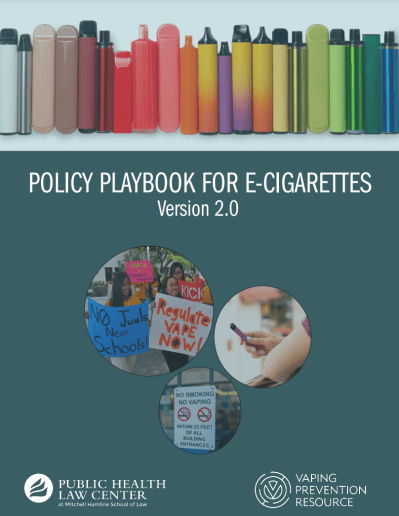
In 2020, the Public Health Law Center, the Vaping Prevention Resource, and the UNC Lineberger Comprehensive Cancer Center partnered to develop a Policy Playbook to assist public health practitioners in adopting state and local policies to address e-cigarette use. This year, they released an updated version of the policy playbook for e-cigarettes with policy and advocacy tools for communities addressing e-cigarette use.
The guide begins with an introduction to the harms of e-cigarette use, current market trends and summarizes action to date to address e-cigarette use taken by the federal government. It continues to the basics of policy, then dives into the primary policy options for addressing e-cigarette use: tobacco retail licensing, updating and implementing smoke-free laws to include e-cigarettes and tobacco pricing policies. Each policy option is broken down by different adaptations of the policy, shares the public health rationale for the policy and lists challenges policy campaigns may face.
The 2022 report includes:
-
- Policy Options
- Tobacco Retail Licensing (TRL): retail restrictions on e-cigarette sales, marketing and promotions
- Restricting Use: strengthening smoke-free laws to include e-cigarettes and expand areas covered by a current smoke-free law
- Pricing Polices: implementing policies at the state or local level that increase the price of tobacco products, including e-cigarettes
- Policy Tips and Challenges
- Using clear language: explicitly list covered tobacco products in a given policy
- Equitable compliance protocols: equitable compliance checks and an equitable penalty process
- Preemption: definition of preemption and tips to understanding local authority in a given area
- Other possible challenges such as lawsuits, regulatory concerns and constitutional rights
The Public Health Law Center website hosts a webinar recording from March 31st, 2022, where subject matter experts share the latest on e-cigarette products and regulation, as well as cover updates to the 2022 Policy Playbook for E-Cigarettes. On the Vaping Prevention Resource website, users can access case studies in communities that have implemented vaping-related policy.
For more information on trends in e-cigarette use and evidence-based interventions to reduce use, check out CADCA’s Practical Theorist 11.
Author: Kellen Schalter, Public Health Manager, GHEA

